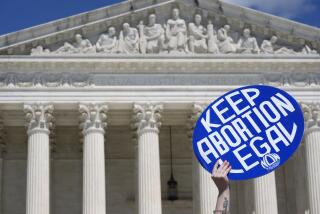Abortion Study Cites Little Mental Stress : Health: Experts find no psychological hazard for most women during the two years following the procedure. Long-term effects are unclear.
- Share via
WASHINGTON — Most women who undergo legal, voluntary abortions early in their pregnancy do not suffer significant psychological distress during the first two years after the procedure, according to a study commissioned by the American Psychological Assn.
Although some women may feel regret, sadness or guilt, “the weight of the evidence from scientific studies indicates that legal abortion of an unwanted pregnancy in the first trimester does not pose a psychological hazard for most women,” said the study, to be published today in the journal Science.
The psychological association is on record favoring abortion rights. A panel selected by the association reviewed 19 studies on U.S. women’s response to abortion that it deemed “methodologically sound.”
However, the longest follow-up of any of the studies reviewed was two years after abortion. “Therefore, no definitive conclusions can be drawn about longer-term effects,” said the panel, adding that research is needed to look at how abortion affects a woman’s mental outlook in the long term.
Olivia Gans, director of American Victims of Abortion, called the study “a manipulation” of data from earlier studies.
Gans, who is a member of the National Right to Life Committee, underwent an abortion in 1981. “The reality of psychological trauma is there,” she said. “As women who have been there, we can point to abortion as the source of emotional debris we have dealt with in our own lives. . . . For many, the problems don’t surface until 10 years after the fact,” she said.
Dr. Louise Tryrer of the Planned Parenthood Federation of America said the new report supports her group’s belief that abortions generally do not lead to serious mental or emotional distress.
“I believe if a significant number of women were suffering severe psychological problems from abortion, you would see the mental institutions overflowing--and that is just not the case,” Tryrer said.
The panel, which conducted its review in early 1989, had previously presented some of its findings to then-Surgeon General C. Everett Koop and members of Congress. In January, 1989, Koop told President Reagan that he would not issue a long-awaited report on the after-effects of abortion because “scientific studies do not provide conclusive data on the health effects of abortion on women.”
The Science report said case studies have shown that some women do experience “severe distress . . . after abortion and require sympathetic care.”
But for the vast majority of women who have voluntary abortions, “severe negative reactions are infrequent in the immediate and short-term aftermath,” the study said.






